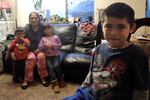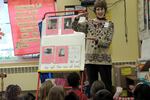Reading, math, science — they're all priorities for today's public schools. But there's something more basic that young students have to master first.
Oregon teachers like Maria Popii see language as a necessary foundation to meet rising standards, which culminate in the state's goal that all students should finish high school, starting in 2025.
"Because we're humans and we need language to interact. And that's how we take in information and we output information. They don't have the language in order to perform academically," Popii says.
OPB is following a group of students in the Class of 2025. In this two-part report this week, we'll learn about language lessons for first graders. Rob Manning begins with language for kids who don't speak English at home.
Octavio Zurita is a first grader at Earl Boyles Elementary School. He and his mom and dad and younger sister and brother speak Spanish at home. Octavio says the language he speaks with friends, depends on where they are.

Octavio speaks Spanish at home with his family and English at school with his teachers and classmates.
Michael Clapp / OPB
"When we play in the park, we speak Spanish. In the class, we speak English," Octavio says.
In years past, Earl Boyles would've taught Octavio English by pulling him out of class, so that he could spend time with an English as a Second Language teacher, like Maria Popii.
"I would go into classrooms, I would take the ESL students, and bring them into my room and teach them for half an hour a day. I would give them English instruction — very general English instruction. So, oftentimes, it had nothing to do with what they were doing in the classroom. It wasn't related to their content. It was strictly language at their level. It mostly included some grammar lessons," Popii says.
The grammar focus helped prepare students for a standardized test called the "ELPA" — the English Language Proficiency Assessment. It lets teachers see how students are progressing — and ultimately, if they're ready to leave the English support program entirely.
Oregon students who advance out of the ESL program actually outperform the state average on standardized tests. But there are far more students from foreign language backgrounds who don't show that kind of progress. They tend to do worse in the tested subjects of math and reading.
David Douglas schools introduced a support system recently aimed at helping students in the bottom 20 percent, academically.
ESL teacher Maria Popii says she noticed a pattern.
"Well guess who most of those students are in third, fourth, and fifth grade? They're ESL students or former ESL students. So these are students who are not progressing throughout the day."
So, the David Douglas schools, like most other schools in Oregon, are changing their approach to language.
Language instruction is now in the classroom, and that has meant big changes to what regular classroom teachers do.
At Earl Boyles, students split up by language level, as measured on an "express test." First graders who need the most help are in Karen McDonald's class.
She uses a call-and-response method that is a hallmark of this approach. When Maria Popii pulled kids out of class, she would make sure they did lots of speaking in English. Popii would only see five or six students at a time, so getting them to speak wasn't hard.
But in a class of 25 or more, it's tough to give each kid a chance to talk. And Popii says speaking English — saying the words out loud — is integral to learning English.
Not to mention, kids who don't have great English skills can be reluctant to speak up.
That's the case with Octavio Zurita, according to his mother, Azucena.

Octavio's mother Azucena knows he can be shy in class about speaking English.
Michael Clapp / OPB
"He knows how to respond, he knows the answers, but he doesn't want to volunteer," she says.
Octavio may not raise his hand and answer questions in the traditional sense, but with call-and-response and other exercises, he does get to speak English.
Karen McDonald uses the techniques in other subjects. At writing time, students go from classmate to classmate, sharing short stories they've written about gingerbread figures.

Ms. McDonald explains the morning's writing assignment.
Michael Clapp / OPB
Jason Freeman — and half of his classmates — are all telling their stories at the same time.
"I made a gingerbread ninja. He tastes delicious. His name is David. He has big green buttons," Jason says.
Earl Boyles provides similar language instruction for native English speakers — like Jason — and foreign-language speakers — like Octavio Zurita.
Officials say it's too early to draw conclusions. Language teacher Maria Popii says she's seeing mixed results.
For instance: remember that test for English Learners — the "ELPA"?
"Well, we saw a really big decline," Popii says.

Students look at photographs of antique inventions and try to write questions that will help them discover what the item is.
Michael Clapp / OPB
According to Popii, the drop was not a surprise. It was the first year teachers used the new approach, and it's less tailored to that test.
Popii is happier with how students did on a broader measure of language. About one-third of Earl Boyles' language learners showed gains on the express test. But Popii says students from English-speaking backgrounds — kids like Jason Freeman — are showing even stronger gains.
"Sixty-four percent of them grew a level. So that's language instruction that those students would not have gotten in our original pull-out model," says Popii.
Those language skills are considered key building blocks for higher-level skills — like applied math and critical thinking — that all students are expected to have.
We continue the language theme Friday, with a look at why language mastery is also important for students who come from English-speaking backgrounds.
Rob Manning's "Class of 2025" reports are part of American Graduate -- Let's Make It Happen! -- a public broadcasting initiative to address the drop out crisis, supported by the Corporation for Public Broadcasting.
